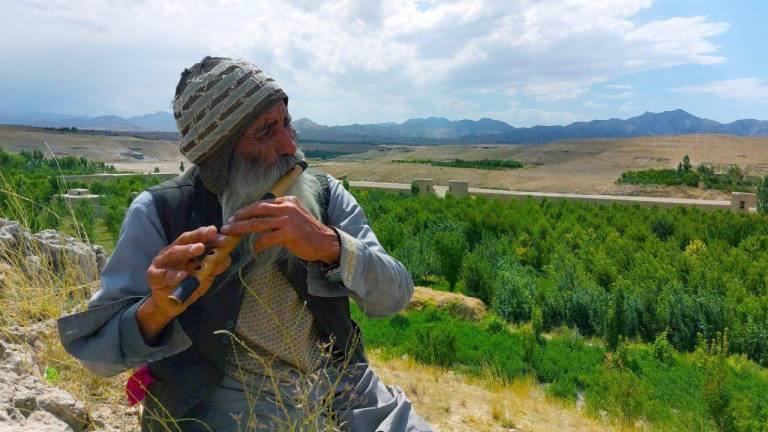His music makes human heart feel pain and calm. Army soldiers, young and old, village men and women, and passers-by listen to nai how it complains about a deep never ending pain of separation existing between a father and two sons. A fiery heartbreaking voice in his nai—which in truth tells a tragic tale of loss—explains the pain a father feels in the absence of his sons. The 63-year-old Janan, who is known as nai-nawaz, literally means nai player, takes his nai whenever he feels sad and lonely. “I play nai whenever my heart feels pain,” says Janan, who has lost two of his young sons in a single day.
In July 2017, the Janan family was busy celebrating second day of the occasional festivity of Eid al-Adha in tiny Qala-e-Naw village of the southern Ghazni province when all of a sudden a heartbreaking news changed the mood in the family. “My oldest son Sher Khan came bemoaning and gave me the saddest news of my life.”
Janan’s sons were serving police in Ghazni.
Early morning, in August 20, 2017, Ghazi Khan, a police officer, along with his brother Mohammad Raziq, who then served as policeman, left their home for Ghazni to attend duty. On their way to Ghazni the Taliban fighters ambushed brothers killing them while they were on a motorbike.
“I saw my sons both laying in pool of blood as I reached to the place where they were attacked,” Janan recalls with a deep pain of loss in his throat.
The nearly-two-decade of war in Afghanistan has taken millions of young lives on two sides of battlefield. The Afghan police, carrying a huge burden of security establishment, has paid a heavy human price to protect the country in an unending fight against the insurgent groups.

Ghazi Khan has left a widow along with five children behind. “My only wish at this age is to bring up these children,” Janan says. “My grandfather loves me a lot,” Roheed, 14, who is the eldest son of Ghazi Khan, told us.
Those killed on both sides of the battlefield are sons of the nation
Every day as the sun sets in Qala-e-Naw village, the 63-year-old Janan, takes his nai and walks over the nearby hill. The village sprouts in silence. He plays nai for hours to explain his lament and moan—a lament and moan which a bloody war has left in compartments of his 63-year-old mind and heart. Though amateur and basic, he often composes words in form of Persian poems which are intimately and inextricably connected to his burning heart.
I am a wandering dervish.
I am a wandering dervish.
My children went to battlefield,
They never came back,
I mean Ghazi and Raziq,
They were the gift of Prophet.
I am a wandering dervish.
I am a wandering dervish.

Mohammad Hakim, who is Baba Janan’s nephew, says that everybody in the village feels connected to Baba Janan’s music. They wait every night for Baba Janan to play nai which calms them. Everybody in the village, including children, have fallen in love with nai and children, who have been inspired by spiritual sound of it, seek to learn playing the instrument and keep his legacy alive for the village.
“You have become weak, you will lose your eye vision,” Baba Janan says as quoting his heart-broken wife. He keeps playing in a way an old father sings for his lost sons. “When I stop playing during the nights, army soldiers who are stationed in nearby platoon signal with torch asking to me to play nai.”
Born in 1957, Mohammad Janan, has experienced living under three regimes. When 17-year-old young, poverty forces him to migrate to Iran. He makes comeback to his country in 1979—the year Khalqi generals toppled Sardar Daud Khan’s government. In subsequent years, he first joins Sayed Ali Beheshti-led Shura-e-Etifaq Islami, as a local military commander in Ghazni but makes a political turn to Gulbuddin-led Hizb-e-Islami when the party takes control over his province. “I was a commander of Hizb-e-Islami, the Taliban conquered Ghazni and took 80 elders as hostages to put pressure on me to surrender,” he recalls. After the Taliban rule in Ghazni, Baba Janan surrenders to the Taliban group but with the fall of the regime in the country he joins local police in Ghazni. “The government authorities did not pay attention to my work, I finally decided to leave local police forever.”
The wound and fatigue of the bloody war are evident in Baba Janan’s eyes. “Those killed on both sides of the battlefield are sons of the nation,” he says. In the wake of the coming intra-Afghan talks, Janan—who has 25 years of military experience— skeptically says, “peace will not be restored in this way; they [the Taliban] sign peace agreement with the Americans in [Doha] but keep fighting here.” He says ceasefire is precondition to a ‘true peace.’ “All I wish for my country is peace.”
Abdul Wahid Haidary, Elitaat-e-Roz’s reporter, has contributed to this story.




